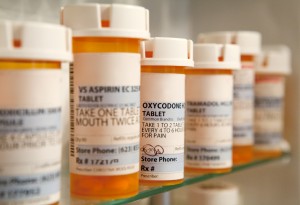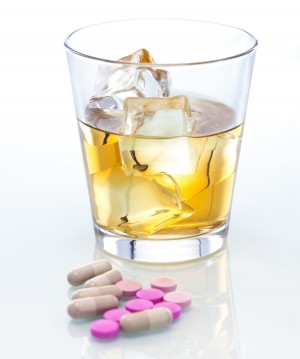 Combining prescription drugs with alcohol can be very dangerous and even deadly. Consuming any amount of alcohol while taking any medication is risky. If you are taking medication of any kind you need to ask yourself some important questions and get the facts before consuming alcohol.
Combining prescription drugs with alcohol can be very dangerous and even deadly. Consuming any amount of alcohol while taking any medication is risky. If you are taking medication of any kind you need to ask yourself some important questions and get the facts before consuming alcohol.
Important Questions
When it comes to prescription medications and alcohol, you need to answer the following questions:
Has the medicine been prescribed for you by a doctor?
You should never take a drug that has not been prescribed specifically for you. Even if you have a diagnosed ailment or symptoms similar to a person who has been prescribed the drug, you should not take their pills. If your name is not on the pill bottle, do not take the drug.
Has the prescription expired?
Do not take a drug that has your name on it if the expiration date has passed. Just because a drug was prescribed for you in the past does not mean that the drug is safe to take now. Always consult your doctor if you are in need of additional medicine.
Is taking the drug medically necessary?
Sometimes a doctor will prescribe a medication to take until gone, or to use “as needed”. If you have been instructed to take a medication until gone, make sure you finish the medication on schedule. If the medication is labeled “as needed”, continue taking the medicine only if you need to do so.
Are you drinking for the wrong reasons?
Many people drink for the wrong reasons. Drinking for the wrong reasons will cause additional problems, even if you are not taking any prescription drugs. For example, you should never drink when you are bored or when you are trying to escape a problem.
Get The Facts
If you have been prescribed any medicine by your doctor, make sure you read all information given to you by the pharmacy when you pick up the drug. Do not assume that drinking alcohol is safe if alcohol is not mentioned directly on the pill bottle label.
Ask the pharmacist specific questions about risks involved in taking the drug, particularly if drinking alcohol will pose additional risks to your health. You can also discuss the drug and alcohol directly with your doctor.
Here are some common prescription drug categories and the known risks that are associated with combining these drugs and alcohol.
Antibiotics
If you have an infection of any kind or are generally ill, a doctor may prescribe an antibiotic. Antibiotics commonly cause dizziness, an upset stomach, and drowsiness. Drinking alcohol can cause the same symptoms, so combining the two is likely to cause an increase in these symptoms.
Some drugs, when combined with alcohol, can lead to a rapid heartbeat, nausea, vomiting, flushing of the skin, headache, and chest pain.
Furthermore, drinking alcohol while you are ill or have an infection can delay your recovery. Consuming alcohol can cause a decrease in your overall energy and make it more difficult for your body to heal quickly.
Painkillers
 Mixing alcohol with painkillers may be the most dangerous drug and alcohol combination. Painkillers and alcohol each cause breathing to slow down and inhibit the coughing reflex, but in different ways. So when combined, pneumonia, aspiration, and choking become very real risks. These symptoms can ultimately lead to death.
Mixing alcohol with painkillers may be the most dangerous drug and alcohol combination. Painkillers and alcohol each cause breathing to slow down and inhibit the coughing reflex, but in different ways. So when combined, pneumonia, aspiration, and choking become very real risks. These symptoms can ultimately lead to death.
You should never drive a vehicle while under the influence of a prescription painkiller or alcohol. Make sure you have alternate transportation available while taking prescription painkillers.
Sleeping Pills
If you are taking medication because you have difficulty sleeping, you should avoid alcohol. Alcohol affects the hypothalamus in the brain causing a slowed heart rate and slowed breathing. When under the effects of a sleeping pill, this can be especially dangerous as breathing can become difficult. Combining sleeping pills and alcohol may also lead to extreme drowsiness, dizziness, memory problems, impaired judgment, strange behavior, and motor control challenges.
Another problem with this combination is that the medication cannot be absorbed by the body quickly enough when alcohol is present. This increases the likelihood that you may continue to drink more alcohol because you are still awake after taking a sleeping pill. Drinking alcohol may also cause you to be too drunk to remember if you have taken your regular sleeping pill which increases the risk of overdose.
Other Prescription Drugs
From diabetes and high cholesterol medications to drugs used to treat attention disorders and depression, the list of prescription drugs available goes on and on. Based upon your symptoms, a doctor may prescribe one of many drugs available. Depending on the drug, you may experience one or more of the following adverse effects when the drug is combined with alcohol:
- Blood clots
- Changes in blood pressure
- Difficulty breathing
- Dizziness
- Drowsiness
- Fainting
- Headaches
- Heart attack
- Heart problems
- Internal bleeding
- Intense itching
- Joint or muscle pain
- Liver damage
- Loss of appetite
- Low blood sugar levels
- Rapid heartbeat
- Seizures
- Stomach bleeding
- Stroke
- Tremors
- Ulcers
- Unusual behavior
- Vomiting
As you can see in reading this list of symptoms, combining prescription drugs and alcohol can lead to very undesirable results. As reported here, prescription drugs were involved in some way in 80% of all drug related deaths in the United States since 2001. Consequently, getting the most up to date information from your doctor and pharmacist regarding your medications and alcohol may literally save your life.
Photo Credits
Photos Courtesy Of Shadow Mountain Recovery
Guest Author Bio
Chris Beazer
 Chris Beazer began her career in 2005 in this field through the experiences and challenges she faced with her daughter’s addiction. Early in her journey, Chris quickly recognized her ability to make a significant difference in the lives of others. She relates to and understands the focus and commitment to the family
Chris Beazer began her career in 2005 in this field through the experiences and challenges she faced with her daughter’s addiction. Early in her journey, Chris quickly recognized her ability to make a significant difference in the lives of others. She relates to and understands the focus and commitment to the family
Blog / Website: Shadow Mountain Recovery Taos
Recent Guest Author Articles:
- How Strong Business Training Translates Into Everyday Decision-Making
- New Career and Degree Paths for Educators Who Want to Make a Broader Impact
- Finding the Right Plumber in Portland: A Comprehensive Guide for Homeowners
- Why Choose Elara Caring for Jackson, MI Home Health Services?
- How I Turned Poetry into a Paycheck


Please Share Your Thoughts - Leave A Comment!